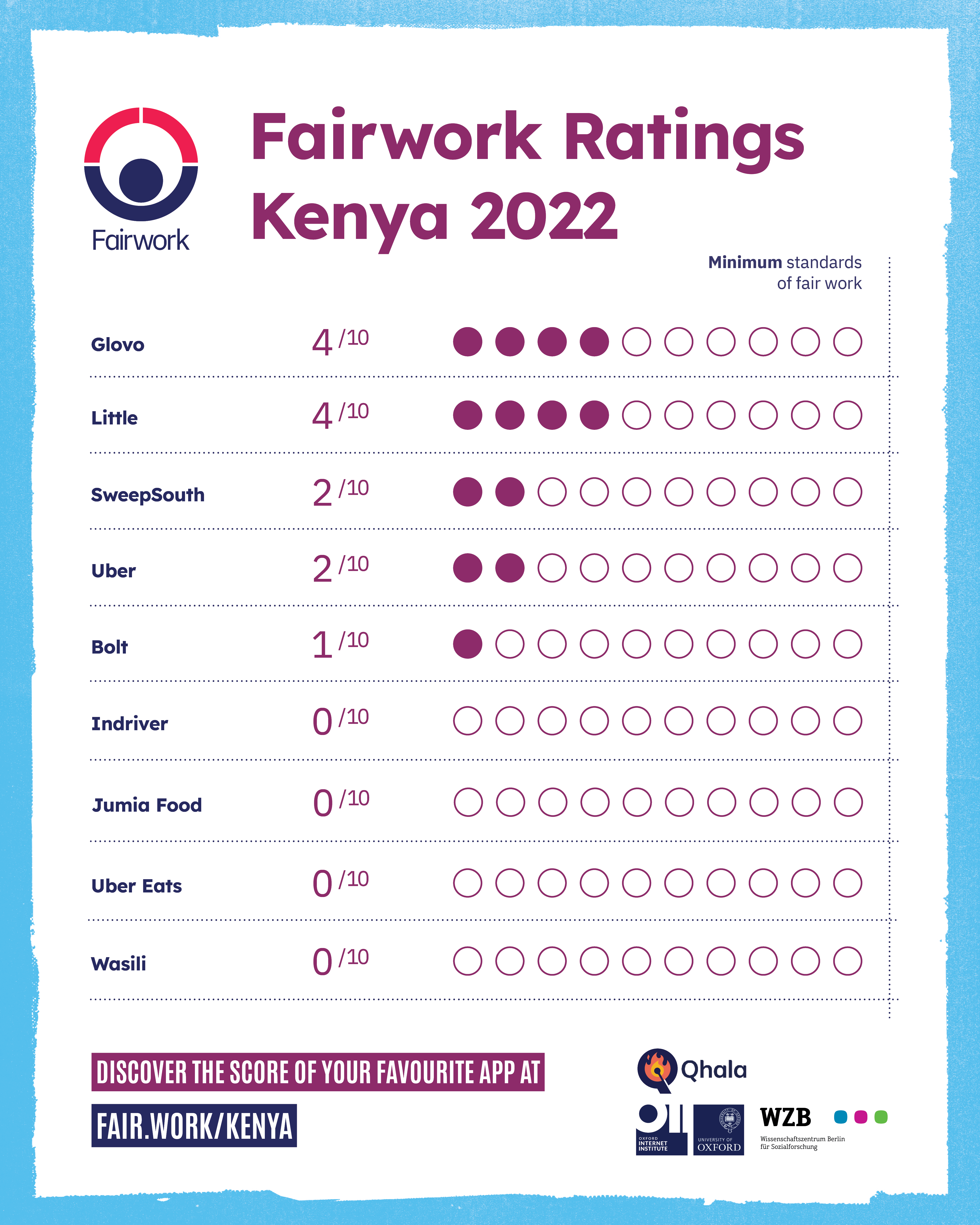Fairwork Kenya launches a new round of ratings for gig work platforms

This second Fairwork report for Kenya continues to analyse digital labour platforms in a country where policy shift has been very slow even as the labour market continues to grow.
Within the last two years, the industry has experienced the ravages of the COVID-19 pandemic as well as an election year that exposed the precarious situations that workers faced. The cost-of-living crisis has had an impact on all sectors of the economy and especially those that offer services that are not considered basic needs. Platform workers are affected directly and have experienced a significant impact on their livelihoods. With the rise of food and essential goods and fuel costs, platform workers have had to work longer hours or quit the industry altogether for it to make financial sense.
There have been several improvements in some platform practices we can see compared to last year’s report. Glovo is making significant improvements by launching and signing the “Couriers Pledge” in late 2022. This involves safety courses, improved insurance products, parental support coverage, and learning programmes for workers.
In 2022, new regulations by Kenya’s National Transport Safety Authority (NTSA) require all digital platforms operating in Kenya to obtain a certificate of registration under the Companies Act, 2015 and to cap commissions charged to drivers at 18%.
While some platforms like Little are complying with the mandate the resistance from platforms, prompted a wave of strikes from platform workers. Our research found some platforms have increased other charges, effectively circumventing the regulations and reducing workers’ earnings after costs.
Ratings
Our report looks at nine of Kenya’s digital labour platforms against five Principles of Fair Work (fair pay, fair conditions, fair contracts, fair management, and fair representation), giving each a fairness rating out of 10. Both Glovo and Little top the Kenya 2022 table with scores of four points each, followed by SweepSouth and Uber with two points each, Bolt with one point, and Jumia Food, Uber Eats, Indriver, and Wasili, who did not score any points at all. While the report highlights some positive changes, it also calls for platforms to improve the overall conditions for their workers.

Key Findings
Fair Pay: There was insufficient evidence that workers for any of the nine platforms earned the minimum wage of KES 15,201 ($122) after costs or the living wage of KES 25,400 ($204) after costs. Therefore, we were unable to award a score to any of the nine platforms on this principle.
Fair Conditions: Two (Glovo and Uber) out of nine platforms could provide evidence of mitigating task-specific risks by introducing insurance policies and practical measures for workers. Both Uber and Glovo have insurance policies, emergency SOS buttons, and deliver relevant safety training. Glovo has a more comprehensive insurance policy, and they provide safety gear such as helmets and reflector jackets to workers on signing up to the platform. Other working equipment, such as courier bags, are provided at a subsidised fee. We urge the platform to provide all safety gear to workers free of charge in the coming scoring year. Uber and Glovo also have elaborate data protection policies which were taken into consideration in awarding a point for this principle.
Fair Contracts: Four (Bolt, Uber, Glovo and Little) of the nine platforms could evidence they provide clear and transparent terms and conditions subject to the law of Kenya. However, we could not evidence that platforms did not exclude liability for workers or prevent workers from seeking redress for grievances arising from their work.
Fair Management: Three of the nine platforms (Glovo, Little, and SweepSouth) evidenced the provision of due process for decisions affecting workers. These platforms demonstrated effective communication channels and appeals processes in instances where workers have been deactivated from the platform. The second point of this principle was not awarded to any platform as we could not find sufficient evidence that platforms are adopting clear anti-discrimination policies, proactive policies that are inclusive of disadvantaged groups, and clarity on how algorithms are used to determine work or remuneration.
Fair Representation: Two of nine platforms (Little and SweepSouth) provided evidence that they ensure freedom of association and collective worker voice, by demonstrating documented mechanisms for workers to freely express themselves and a formal policy of willingness to bargain with a collective body of workers. However, only Little formally and publicly recognised an independent collective body of workers by signing a Memorandum of Understanding (MOU) with the Organisation of Online Drivers (OOD).
What can I do? Fairwork Pledge
As part of Fairwork’s commitment to making platforms accountable for their labour practices, we have launched the Fairwork Pledge. This pledge aims to encourage other organisations to support decent labour practices in the platform economy, guided by the five principles of fair work.
Organisations like universities, schools, businesses, investors and charities that make use of platform labour can make a difference by supporting platforms that offer better working conditions.
Organisations have the option to sign up to the Pledge as an official Fairwork Supporter or an official Fairwork Partner. Those signing up to be a Supporter must demonstrate their support for fairer platform work publicly and provide their staff with appropriate resources to make informed decisions about what platforms to use. Becoming a Fairwork Partner entails making a public commitment to implement changes in their own internal practices, such as committing to using better-rated platforms when there is a choice.
More than 40 organizations, including GIZ, Solidarity Center, Learning Lions, WZB Berlin Social Science Center, and FES, have already signed the pledge. Join them in demanding a fairer future of work!